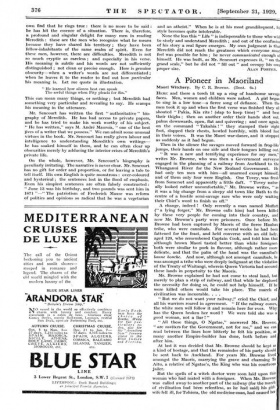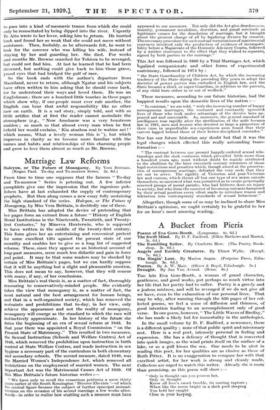A Pioneer in Maoriland
Maori Witchery. By C. R. Browne. (Dent. Os.) HERE and there a torch lit up a ring of handsome savage faces. Men, women and children were naked. A girl began to sing in a low tone—a fierce song of defiance. Then the men took it up and when the first verse was finished they all shouted " Pakia, Kia rite ! (slap to keep time) " and beat their thighs ; then on another order their hands shot out, palms downwards, open, flat and quivering ; and once again, on the command " Takahia ! " they stamped their right foot, slapped their chests, howled horribly, with blood lust in their voices. It was the Maori war-dance, and it stopped as suddenly as it had begun.
Then in the silence the savages moved forward in frog-like jumps, their hands on one side and their tongues lolling out.
" It was a new and terrifying experience for my men," writes Mr. Browne, who was then a Government surveyor engaged in the planning of a railway from Auckland to the Whanganui River for the New Zealand Government. He had only ten men with him—all unarmed except himself, and of them only four were English. One Tovey, was fresh from Somerset and apparently a little daft. " Tovey natur. ally looked rather uncomfortable," Mr. Browne writes, " as it was a big change from a sleepy old town like Bath to the centre of a hostile semi-savage race who were only waiting their Chief's word to finish us off."
A change, indeed ! Only recently a man named Moffatt (" a lying forger," Mr. Browne calls him) had been killed by these very people for coming into their country, and now Mr. Browne's party were prisoners. Once before Mr. Browne had been captured by Maoris of the fierce Hauhau tribe, who were cannibals. For several weeks he had been fattened for the feast, and held converse with an old lady, aged 120, who remembered Captain Cook, and told him that although brown Maori tasted better than white foieigner, both were similar to pork in flavour, although rather more delicate, and that the palm of the hand was the cannibal's bonne bouche. And now, although not amongst cannibals, he was amongst a tribe who were deeply indignant at the violation of the Treaty of Waitangi, wherein Queen Victoria had secured these lands in perpetuity to the Maoris. - Mr. Browne explained he had not come to steal land, but merely to plan a strip of railway, and that while he-deplored the necessity for doing so, he could not help himself. - If he were killed others would take his place. The march of civilization was inexorable. . . .
" But we do not want your railway," cried the Chief, and all his warriors roared in agreement. " If the railway comes, the white men will follow it and remain here- for ever. Why has the Queen broken her word ? We were told she was a good woman, not a liar ! "
" All these things, 0 Ngatae," answered Mr. Browne, " are matters for the Government, not for me," and we can read between the lines how bitterly he felt his position, as many another Empire-builder has done, both before and after him.
At last it was decided that Mr. Browne should be kept as a kind of hostage, and that the remainder of his party should be sent back to Auckland. For years Mr. Browne lived amongst the Maoris, marrying the grave and charming Te Aitu, a relative of Ngatae's, the King who was his courteous jailer.
But the spells of a witch doctor were soon laid upon this woman who had mated with a foreigner. When Mr. Browne was called away to another part of the railway (for the march of civilization had been relentless, as he had said) his girl' wife fell ill, for Tohiora, the old medicine-man, had caused her
to pass into a kind of mesmeric trance from which she could only be resuscitated by being dipped into the river. Urgently Te Aitu wrote to her lover, asking him to xeturn. He hurried back and found her so weak that she could not move without assistance. Then, foolishly, as he afterwards felt, he went to look for the sorcerer who was killing his wife, instead of staying by her and guarding her. She died. For weeks and months Mr. Browne searched for Tohiora to be revenged, but could not find him. At last he learned that he had been drowned, but nothing could give back to him those grave, proud eyes that had bridged the gulf of race.
So the book ends with the author's departure from Maoriland, never to return, although Ngatae and his subjects have often written to him asking that he should come back, for he understood their ways and loved them. He was an Englishman : there are a hundred little touches in these pages which show why, if one people must ever rule another, the English can bear that awful responsibility like no other race on earth. It is a sad story, simply told, and with so little artifice that at first the reader cannot assimilate the atmosphere (e.g., " Now Amohaere was a very beauteous maiden ; so much so that almost every man when he first beheld her would exclaim, ' Kia ataahua mai to wahine nei ' which means, What a lovely woman this is "), but which improves in clarity as we become more familiar with the names and habits and relationships of this charming people and grow to love them almost as much as Mr. Browne.













































 Previous page
Previous page